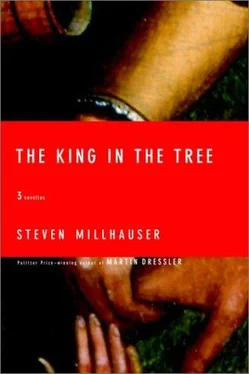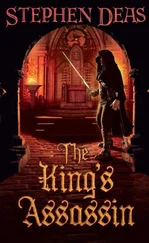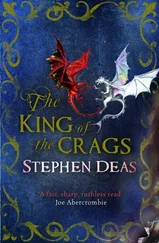There is yet another possibility. The King, heavily burdened by the duties of kingship, longs for the purity of a suffering that eludes him. Freed by imprisonment from the distractions that prevent him from suffering enough, at liberty to enter his unhappiness as completely as he can, does the King sometimes feel, in his new kingdom, a dark consolation, a secret joy?
The royal bedchamber is empty. The King is in prison, Tristan and the Queen have been banished into the realm of faery, the castle tosses in its sleep — and I, Thomas of Cornwall, sit at my table before a sheet of smooth-scraped parchment, dipping my quill in ink blacker than night, writing words that gleam for a moment in the light of my candle like drops of black blood.
For six days the King has remained his own prisoner, sleeping on straw, eating crusts of bread, seeing no one. The knight entrusted with the King’s care reports that the King moves very little, standing only to cross the small room to another wall, where he sits with his great head bowed. He has asked for his crown, which he wears like a heavy punishment. Sometimes he removes the crown to strike weakly at a rat. His eyes, when he opens them, are unusually large above his hollow cheeks. He stares emptily, looking at nothing. Mostly he sleeps. On the ninth day of the King’s self-imprisonment, a knight came striding into the great hall, while we were at supper. This was his story.
He had been hunting in the Forest de la Roche Sauvage, some three leagues from the King’s forest, when, pursuing a stag, he crossed a stream and entered a thicker and wilder part of the woods, where he made his way with difficulty among the trees. In the near distance he saw a small clearing with a rude hut. As he drew closer to the clearing, the door of the hut opened and a man stepped out. He recognized Tristan. The knight, abandoning all thought of the hunt, spurred his horse toward our castle.
I informed the King, who upon hearing the news rose unsteadily to his feet. Leaning on my shoulder, he left his wretched cell and returned with me to the royal bedchamber.
Tomorrow, despite his weakened condition, he insists on leading a hunting party into the Forest de la Roche Sauvage.
I will try to record only the most important events of this memorable day.
The King, refreshed by nourishment and sleep, but still seriously weakened after his nine days in the tower, rose at dawn, attended mass at the chapel, ate a breakfast of bread and ale, and ordered our party to depart. Except for a moment of faintness immediately after he mounted his horse, he sat erect in the saddle; I marveled at the return of his strength, while at the same time I had the uneasy sense that he was animated less by physical vitality than by the unnatural glow of a devouring fervor. In the Forest de la Roche Sauvage — named for the bare crag rising at its eastern extremity — our party of two dozen broke into pairs. Each man carried an ivory hunting horn, which he was to sound at the first sign of Tristan or the Queen. I rode with the King.
It is possible to ride for days in the Forest de la Roche Sauvage without coming to a clearing. Sometimes the growth is so thick that one can ride no farther; here and there among the oaks and pines stand towering tangles of thorn, with immense black spikes the size of spear points. The King’s proud face, with its still-gaunt cheeks, had begun to show signs of weariness. Urging my own tiredness, I persuaded him to dismount and sit with me on the mossy roots of a massive oak, through whose dark and prickly leaves only small pieces of blue sky were visible.
A white brachet hound, which had accompanied us on our journey, sniffed about as we sat against the broad trunk. The King, settling back, half closed his eyes. Suddenly the brachet darted off after a rabbit, disappeared into the undergrowth, and was gone.
This was one of the King’s favorite hounds. He called out to it, then rose with a sigh to fetch it back. I followed him through trees growing so close that no horse could have entered. The undergrowth thickened, ferns as long as sword blades thrust up, and suddenly we came to a small opening in the trees. Before us stood a peasant’s hut. It had a roof of thatch and a frame of rough timber, filled in with clay over a weave of branches that poked through here and there.
The King placed his hand on his sword, and I followed him across the sun and shade of the clearing to the single small window in the side of the hut.
On an earthen floor covered with rushes, the Queen and Tristan lay asleep on their mantles. They were fully clothed, in tunic and surcoat, and lay facing each other so that their mouths were no more than a hand’s width apart. Between them on the blanket lay Tristan’s naked sword. A ray of sunlight, coming through the window, lay slantwise along the dark, striking the Queen’s cheek, the tip of the sword, and Tristan’s shoulder.
The King watched for a long time as the two lay there breathing gently. A wisp of the Queen’s hair stirred in Tristan’s breath.
I looked at the King’s face, with its terrible tumult of despair and joy, and turned my face away.
Raising a finger to his lips, the King drew his sword and made his way stealthily around the hut toward the door. Through the little window I watched the door open. The King stepped over to the sleeping pair and stood looking down at them with his sword held out as if in readiness. Then he bent over, carefully lifted Tristan’s sword, and laid his own sword between them.
He looked down at Tristan and the Queen lying side by side, the sun on her cheeks, wisps of her hair stirring in Tristan’s breath. For a moment I had the strange sensation that he was going to lie down beside them. Then he turned and made his way out of the room, into the clearing.
Not until we returned to our horses did the King speak. “Lovers lie naked,” he said. At a nearby rustling he whirled, gripping Tristan’s sword.
It was only the white brachet, bursting through the undergrowth, its tail wagging wildly, its coat matted with burrs.
Lovers lie naked; the Queen and Tristan are innocent. Between them the sword: the very sign and symbol of that innocence. Tristan and the Queen, wronged by jealousy and evil rumors, flee to the dark forest, where he watches over her like a brother. When she bathes in a stream, he stands guard beside the water, his sword drawn, his eyes scanning the woods for danger. At night they remove only their mantles. The sword lies between them when they sleep.
How deeply, in order to believe this, the King must have suffered.
There is great rejoicing in the castle. In the high hall the tables and benches are removed for games and dancing; minstrels sing the adventures of Arthur and Gawain. Tristan and the Queen have returned! — summoned by the King, pardoned in Council, welcomed before the entire court. The King’s laughter rings out among the revelers. Tristan sits at his right hand, the Queen at his left; he looks from one to the other joyously. It is as if we were celebrating the visit of a young prince and his bride.
He has given them freedom to go and come as they like. Indeed, the King has asked the Queen to stay close to Tristan, whenever he himself is not with her. As the days pass, the King absents himself more and more, hunting with his knights and barons in the royal forest beyond the orchard. One has the impression that he is abandoning the Queen to Tristan by day, in exchange for the Queen in his bed at night.
They, for their part, do not devour each other with adoring looks but behave with modesty and discretion, as befits the King’s wife and nephew. It is true that the Queen, accompanied by Tristan, occasionally visits the women’s quarters, or her walled garden, but these absences are of such short duration that they cause puzzlement rather than slander. It is almost as if, since their return from the Forest de la Roche Sauvage, the Queen and Tristan had agreed to remain apart from each other, in order to demonstrate their gratitude to the King.
Читать дальше












